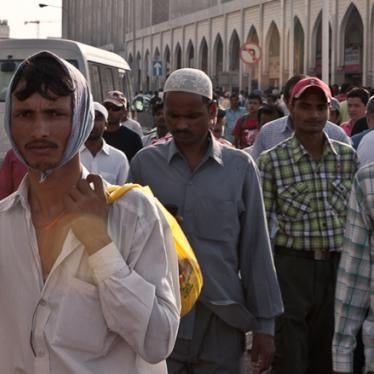(Doha) – Qatari authorities should implement labor reforms to protect migrant workers from serious human rights abuses; proposed reforms in 2014 are a welcome step but need to go further, Human Rights Watch said today in its World Report 2015.
In response to mounting international pressure over serious rights abuses in its construction sector, Qatari authorities announced their intention to implement proposed labor reforms “by early 2015.” The proposals lack detail, but, if implemented, would partially reform Qatar’s sponsorship-based kafala system, increase fines for passport confiscation, and make it easier for workers to receive exit visas to leave the country. However, reforms based solely on these proposals will not adequately protect migrant workers from human trafficking, forced labor, and other rights violations, or ensure their right to leave the country.
“Qatar has recognized that reform is necessary and has promised to take some steps in the right direction,” said Sarah Leah Whitson, Middle East and North Africa director. “At a time when Qatar’s detractors are seeking to strip the country of the 2022 World Cup, Qatar’s best defense would be to pass meaningful legislative reforms that end the sponsorship system, punish abusive employers, and end worker-paid recruitment fees once and for all.”
In the 644-page world report, its 25th edition, Human Rights Watch reviews human rights practices in more than 90 countries. In his introductory essay, Executive Director Kenneth Roth urges governments to recognize that human rights offer an effective moral guide in turbulent times, and that violating rights can spark or aggravate serious security challenges. The short-term gains of undermining core values of freedom and non-discrimination are rarely worth the long-term price.
In May 2014, a Ministry of Interior news release announced a series of proposals on labor reform, including allowing workers to change employers at the end of their contracts without the consent of their existing employer. If this is complemented by a provision that allows workers to change employers before the end of their contract in cases of abuse, it would be a significant step forward. A proposal to increase five-fold the sanction for passport confiscation would have an important deterrent effect if complemented by a stated intention to rigorously enforce the law.
Qatar also has pledged to reform its exit visa system, which grants employers unfettered discretion to prevent migrant workers from leaving the country. Under the new proposal, an automated system will issue exit visas after a 72-hour grace period. However international law makes clear that everyone has a basic right to leave any country, including their own. Restrictions on this right should only be imposed on an individual basis, according to clear law and for specific reasons such as when a person is subject to criminal investigation. Qatar should therefore abolish its exit visa system outright.
Qatar has yet to announce if the reforms will apply to migrant domestic workers. In addition to the problems the general migrant worker population faces, a recent Amnesty International report documented that migrant domestic workers have suffered verbal, physical, and in some cases sexual abuse at their places of work. They are excluded from the general protections of the country’s labor laws.
“Domestic workers are isolated in private homes and often at especially high risk of abuse,” Whitson said. “Qatar should not limit its reforms to the construction sector, but extend labor law protection to domestic workers and ensure that changes to the kafala system apply to them too.”
Qatar also passed laws that pose a further threat to its reputation as a center for media freedom. In September the emir approved a law “on the suppression of electronic crimes,” vaguely worded provisions that provide for prosecuting people who publish “false news with the intent of endangering the public order,” and information that “infringes social principles or values.”







